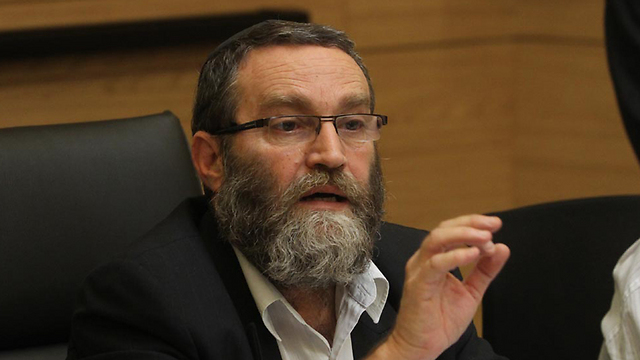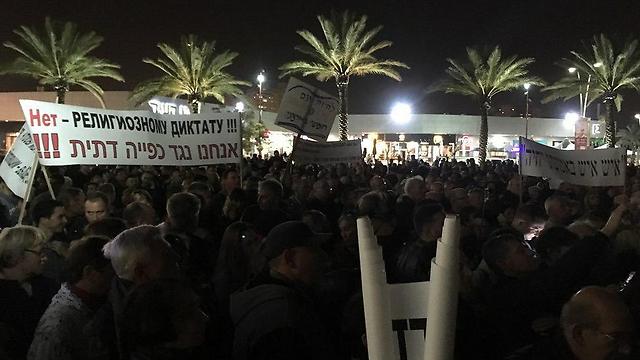

MK Gafni: Non-Jewish inspectors to enforce Shabbat laws
After Interior Minister Deri tells Yedioth Ahronoth he has no intention of enforcing recently passed Supermarkets Law, United Torah Judaism lawmaker says in closed meeting Haredim have reached an agreement with Prime Minister Netanyahu to task 'hundreds of gentile inspectors dealing with illegal immigration' with law's enforcement.
After Interior Minister Aryeh Deri told Yedioth Ahronoth last week that he had neither the authority to enforce the new law, nor the intention of doing so, one of the senior ultra-Orthodox Knesset members is now presenting an entirely different picture.

Haredi website Kikar Hashabat on Monday published recordings of from a closed conference, in which MK Gafni is addressing the shortage of manpower for enforcing different Shabbat-related laws, including the Supermarkets Law.
"There was an agreement with the prime minister, and this is what has to happen now," Gafni said. "There is a great difficulty enforcing the laws, and the agreement was that due to the fact that there are hundreds of gentile inspectors—perhaps even more—who are dealing with illegal immigrants, the enforcement issue is going to get on track, and this is a positive and essential track. I hope these things will indeed happen."
Gafni, who chairs the Knesset's Finance Committee, boasted in the conference—organized by the United Hatzalah emergency medical service—that the Haredim had succeeded in changing the delicate balance of power vis-à-vis secular Jews on state and religion affairs.
"If this whole system we have been talking about is completed, we'll not only maintain the status quo but also make progress on the Shabbat issue."
In the recording, Gafni recounts his conversation with Prime Minister Benjamin Netanyahu several days ago, a moment before the government approved the state budget, giving the Haredim everything they had asked for.
"The prime minister called me at 2 am on Thursday and said to me, 'Rabbi Gafni, I'm asking you to help us pass the budget and to agree.' I said to him, 'Mr. Prime Minister, what do you want me to agree to, when funds to our schools—our seminaries—are being cut?' So he said, 'What do you suggest?' I said, 'I suggest that you give us back the cuts, down to the very last shekel, otherwise it won't pass.' And that's what happened, and the budget was approved unanimously."
Sources in the Interior Ministry denied Gafni's comments on Monday, saying no decision had been made to send ministry inspectors to enforce the Supermarkets Law. According to the sources, neither the ministry nor the minister are authorized to issue such an order.
Gafni's recordings sparked a row in the political arena. MK Elazar Stern of Yesh Atid said Monday night, "I'm anxiously waiting for the response of Education Minister Naftali Bennett, who claims to lead the Religious Zionist movement, to the change in the status quo in favor of the Haredim. Will he bury his head in the sand once again?
MK Rachel Azaria of Kulanu said she and her party would not accept any change in the status quo. "The Supermarkets Law changes nothing about the status quo. Forcing mayors to enforce the law is a blatant violation. That won't happen."
Ashdod Municipality searching for non-Jewish inspectors
Meanwhile Tuesday, the Ashdod Municipality published an ad on its website in search of students for inspector jobs aimed at enforcing municipal bylaws, including a law against opening businesses on Shabbat.
The ad states it is directed at "a population whose day of rest is not Shabbat."
On Saturday, more than 1,000 Ashdod residents staged a protest against the increased enforcement of Shabbat laws in the city. They carried signs reading, "We are against religious coercion."
"The municipality keeps ignoring the residents, and if they thing the protests will stop—they're wrong," said Guy Sa'ar, one of the protest leaders. "The municipality can't decide how we should live and change our status quo. The residents are the only ones who will decide."
Yudit Keller contributed to this report.

















